Since Belgium has put in place sanctions against Russia, customs have seized 27,000 containers for inspection, according to figures obtained by De Standaard. The public prosecutor's office has now started investigating 30 cases with clear infringements, while Belgium has frozen suspicious assets worth roughly €50 billion.
Around 500 containers that were destined for Russia are being monitored and will only be released if the affiliated companies can prove that they aren't subject to European sanctions. If not, customs will inspect the contents of the containers. Customs have found around 30 cases which infringed on the new rules. Reports on the cases have been sent to the public prosecutor's office.
Since economic sanctions were introduced, controlling products sent to and from Russia has been a key priority for customs authorities. Customs officials target shipments for Russia but also neighbouring countries including Kyrgyzstan, Armenia, Kazakhstan and Georgia.
Money flows
Belgium is also trying to restrict the flow of money from Russia. By the end of 2022, 1,110 people and 83 entities were on a financial sanctions list, according to data that De Standaard requested from the Finance Ministry (Federal Public Service Finance). These figures revealed that Belgium has frozen €50 billion in suspicious assets.
The assets often belong to people who to try hide them or transfer them to people not subject to sanctions. In such cases, the Finance Ministry will block the release of the assets until further investigation has been concluded.
Related News
- Russian budget hit hard by drop in energy exports
- Russian bank takes Belgium to court over $110 million in frozen funds
After Russia invaded Ukraine in February last year, the EU imposed a series of sanctions against Russia. Individuals linked to Russian President Vladimir Putin have been sanctioned, while services, trade and travel have been restricted.

